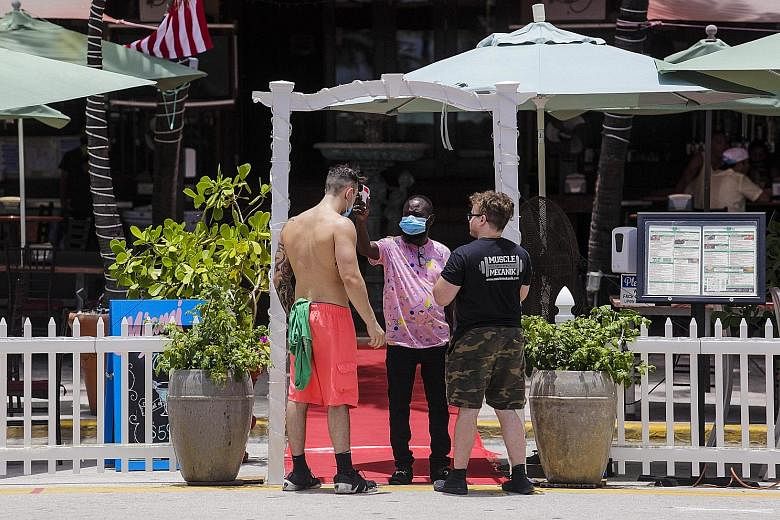Bad news on the coronavirus pandemic front is mounting in the United States, as some states continue to see spikes in infections.
This has raised the spectre of a delayed economic recovery as states backpedal on reopening, even as 47.2 per cent of Americans are now jobless. Faced with this, more Republican leaders have come out to urge people to wear masks and practise social distancing.
States that watched New York City when it was swamped with cases and deaths in early April are in the same position now - but with younger patients.
In southern California, Los Angeles County recorded a one-day spike of nearly 3,000 new infections on Monday, taking its total to more than 100,000 cases. Public health officials warned that hospitals could soon be overwhelmed.
"This is the time to hunker down back in your home whenever you can," the county's director for public health, Dr Barbara Ferrer, said. "Please, let's not let go of everything we worked hard and sacrificed for."
Texas broke a streak of 16 record-breaking days for hospitalisations on Sunday, but Monday saw a jump of 416 patients to 5,913.
Florida - where the Republican Party is due to hold its convention in Jacksonville next month - saw 5,266 new cases of Covid-19 on Monday, a drop after more than 8,500 new cases on each of the three previous days.
Arizona is among several states that have reversed decisions to open up sectors of the economy, saying it will close all bars, gyms and movie theatres for at least a month, as the number of cases doubled to 74,533 in two weeks.
"Our expectation is that our numbers next week will be worse," Arizona Governor Doug Ducey said.
The country's top infectious diseases expert, Dr Anthony Fauci, has said an "all or none" approach had contributed to the surge.
"There are crowds. They are not physically distancing and they're not wearing masks. That's a recipe for disaster," he told CNN in an interview aired on Monday.
"What has happened, I guess understandably, but nonetheless regrettably, is that people took the attitude… either you're locked down or you just let it fly and you just ignore many of the guidelines."
Earlier on Sunday, Health and Human Services Secretary Alex Azar said the "window is closing" to stop the spread of the coronavirus.
"We have to act and people as individuals have to act responsibly," he said. "We need to social-distance. We need to wear our face coverings if we're in settings where we can't social-distance, particularly in these hot zones."
City authorities in Jacksonville on Monday made wearing a mask mandatory indoors - raising questions over the Republican National Convention as President Donald Trump has made a point not to wear a mask in public. White House spokesman Kayleigh McEnany on Monday said Mr Trump has "no problem" with people wearing masks, but added that mask-wearing was a personal choice.
But more Republicans are trying to project the right message. Vice-President Mike Pence, in a visit to Texas on the weekend, urged Texans to wear masks.
And in the Senate on Monday, Majority leader Mitch McConnell said: "We must have no stigma, none, about wearing masks when we leave our homes and come near other people. Wearing simple face coverings is not about protecting ourselves. It is about protecting everyone we encounter."
Even so, there is no national mandate to wear masks; it is up to the local authorities to decide.
In a note to clients cited by CNBC, Goldman Sachs chief economist Jan Hatzius wrote: "A national mandate could raise the percentage of people who wear masks by 15 (percentage points).
"These calculations imply that a face mask mandate could potentially substitute for lockdowns that would otherwise subtract nearly 5 per cent from GDP."











